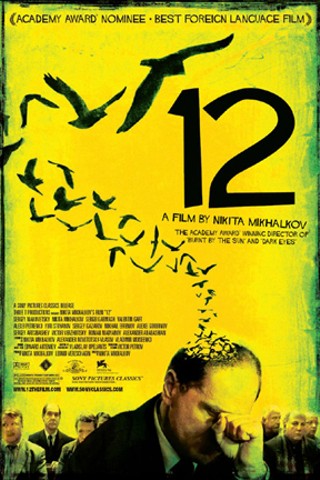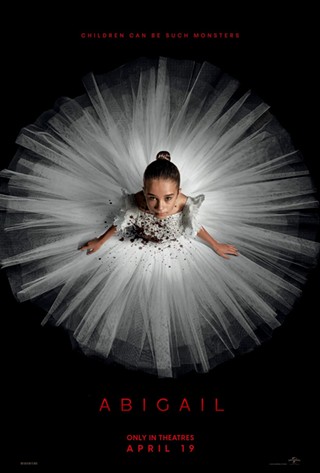In the Soviet Union, people would stand in line for hours just to buy some bananas. This shows that Russians are very patient people; perhaps that's why their films are so long.
12 runs for about 2 1/2 hours. It also takes place almost exclusively in a single room. And the cast is almost all middle-age men. And nobody in the room has superpowers or a friend who's a magical giraffe. So making this all work must have been a true challenge for director Nikita Mikhalkov, and yet—and I hate to say this about a man who is known as "The Russian Spielberg"—he really pulls it off.
There are a few missteps, and the film could have been shorter by about a half-hour without losing any of its punch, but Mikhalkov takes what is very much a filmed play and turns it into something that could only be a movie.
The story is about 12 irate, indignant and/or wrathful men who are acting as a jury in the case of a Chechen boy accused of murdering his Russian stepfather. The film starts as the jurors are being led to their deliberation chamber: a high school gymnasium.
This is probably Mikhalkov's best idea, and the one that turns 12 into something cinematic. The gym is enormous, larger than a full-size basketball court, with 50-foot ceilings and piles of pads, balls, weights, benches and other equipment stacked into corners. If you're going to film a movie in a single room, it makes sense to make it a big, interesting room.
This gives Mikhalkov plenty of space to move his camera around. Cinematographer Vladislav Opelyants (rhymes with "get yer ma some elephants," sort of) rises to the occasion with some truly impressive work. His camera zooms around the room, locking on actors' faces as they re-enact the crime, moving tightly into corners and pulling up to establish the strange scene of the 12 irritable men dwarfed by the immense space. To spice things up, a sparrow is let loose in the gym, and in one memorable tracking shot, the camera follows it as it swoops down from a perch high on one end of the room, buzzes the jurors, and then alights on a desktop display of Orthodox piety. I imagine they had to CGI the bird in for that shot, but it looks completely convincing, and the roller-coaster effect is the perfect, visceral interruption to the juror's long-winded deliberations.
One problem with the film, though it's also a strength: Each juror winds up giving a speech, usually about something personal, that they then tangentially relate to the case. One man got a second chance in life, so let's give this Chechen a second chance. Another talks about the corruption in the system that would allow a native Russian to get away with a crime, so shouldn't the Chechen be given the same break? And the evil, racist juror reveals the heart of his evil racism, humanizing and demonizing him at the same time.
Etc. The problem is that the speeches aren't really about the case, so as the tide shifts in the deliberations, it's only due to the rehearsal of the evidence to a small extent. But the actors really get to shine in their soliloquies, and each character is highly distinct, universally human and yet distinctly Russian.
In fact, Mikhalkov does a great job of Russian-izing this very American story. The jurors, instead of just being 12 guys expressing their rage, have a kind of nervousness and resentment reflective of the recent collapse and restructuring of not only their government, but the ideological basis of their entire lives. One of the jurors is a Harvard-educated TV executive who can bring in American concepts, like "beyond a reasonable doubt." But this only further Russianizes the movie, creating tension about the foreign influence on Russian media.
Most importantly, the fact that the accused is Chechen gives Mikhalkov the chance to run flashback sequences of the conflict in Chechnya and to raise the specter of recent Russian imperialism and its effects. A cab driver goes on about the "animals" from the Caucuses who have moved en masse to Moscow; a Georgian surgeon complicates the petty racism with his high social status and intimate knowledge of Caucasian culture; the mystically calm foreman reveals deep knowledge of local plots by and against the Chechen immigrants.
All of which leads to a strange and somewhat fanciful ending that seems more like the start of a Hong Kong action film than the end of a Russian courtroom drama. But it all basically works, mostly due to the inventiveness of the staging. There's something particularly sly and postmodern about setting a filmed play in a high school gymnasium, and Mikhalkov perhaps takes this as an excuse for some excessive theatricality.
But if you can suspend disbelief about the nature of the proceedings and just enjoy the stagey, intense and highly variegated performances, 12 has a lot of rewards, and shows that any given jury is more than just a dozen people with anger problems.
View trailer:











